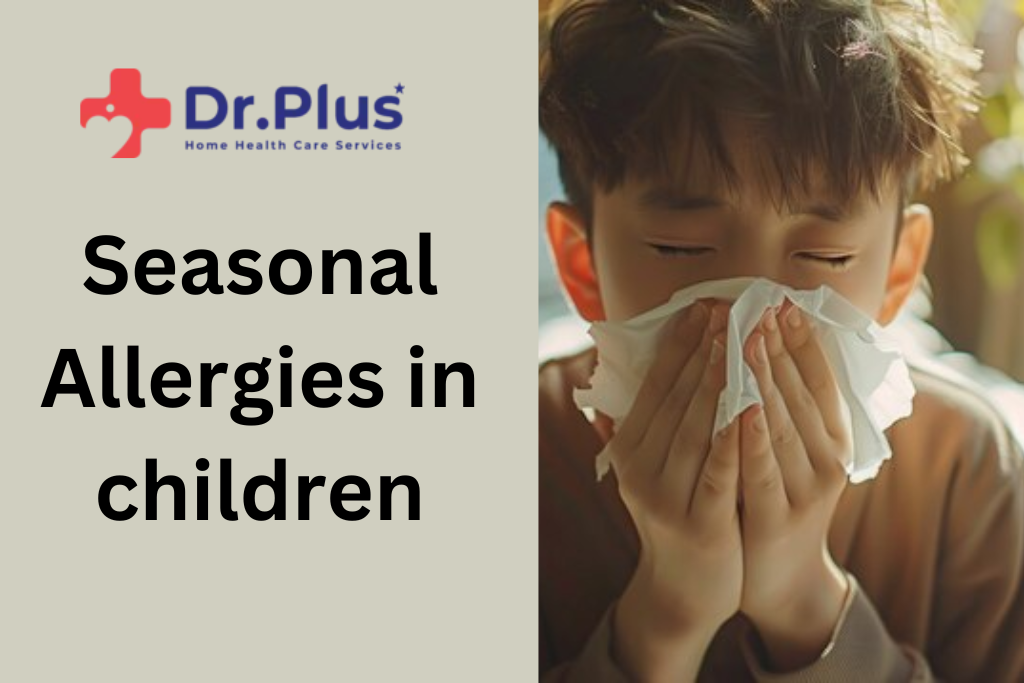
Seasonal Allergies in Children: Tips Every Parent Should Know
Seasonal allergies, also known as hay fever or allergic rhinitis, are a common health concern among children, especially during specific times of the year. These allergies occur when a child’s immune system reacts to allergens like pollen, mold, or dust present in the environment. Although seasonal allergies are not life-threatening, they can significantly impact a child’s daily life, sleep quality, and overall well-being if left unmanaged.
In this blog, we will explore the causes, symptoms, diagnosis, and effective strategies for managing seasonal allergies in children, along with tips to minimize their exposure to allergens.
What Causes Seasonal Allergies in Kids?

Seasonal allergies are triggered by specific allergens that are more prevalent during certain seasons. The most common causes include:
Pollen:
- Spring Allergies: Tree pollen is a common culprit in spring.
- Summer Allergies: Grass pollen dominates during the summer months.
- Fall Allergies: Ragweed pollen is a leading cause of allergies in the fall.
Mold:
Outdoor mold spores thrive in damp environments, such as piles of leaves in autumn or rainy seasons, and can trigger allergies in children.
Dust and Dust Mites:
Although more common as a year-round allergen, dust can intensify during the change of seasons when cleaning routines or ventilation changes stir up particles.
Animal Dander:
Pets shedding more hair during certain seasons can contribute to allergic reactions in sensitive kids.
Here are the Symptoms of Seasonal Allergies in Kids
Symptoms of seasonal allergies can vary from mild to severe, but the most common signs include:
Sneezing:
Often sudden and repetitive.Runny or Stuffy Nose:
Clear nasal discharge is a hallmark of allergies.Itchy Eyes, Nose, or Throat:
Persistent itching can be a telltale sign of allergic reactions.Watery or Red Eyes:
Often mistaken for conjunctivitis.Coughing:
Specially during night due to postnasal drip.Fatigue:
Poor sleep caused by nasal congestion can leave kids feeling tired.Headaches:
Sinus congestion can result in discomfort or headaches.
It’s essential to differentiate between seasonal allergies and a common cold, as the latter usually lasts about a week and may include a fever, unlike allergies.


How Are Seasonal Allergies Diagnosed?
If you suspect your child has seasonal allergies, consult a pediatrician or allergist. Diagnosis typically involves:
Medical History:
Your doctor will inquire about your child’s symptoms, their timing, and any family history of allergies or asthma.
Physical Examination:
A thorough physical exam, especially of the nose, throat, and eyes, helps rule out other conditions.
Allergy Tests:
- Skin Prick Test: Tiny amounts of allergens are applied to the skin to observe reactions.
- Blood Test: The blood test measures the presence of specific antibodies (IgE) related to allergens. Dr.Plus Home Health Care also provides blood test at home if your child is sufferring from anykind of allergy
Effective Ways to Manage Seasonal Allergies in Kids
Managing seasonal allergies involves a combination of prevention strategies, medical treatment, and lifestyle adjustments. Here’s is the way on how you can help out your child:
Reduce Allergen Exposure:
- Monitor Pollen Levels: Use weather apps or local forecasts to track pollen counts and limit outdoor activities during peak times.
- Keep Windows Closed: If your child is allergic to high pollen seasons then use air conditioning to certain room temperature instead of opening the windows and doors for long time.
- Shower After Outdoor Play: Bathing helps remove pollen from the skin and hair.
- Use HEPA Filters: Install high-efficiency particulate air filters in your home to trap allergens.
Medical Treatments:
- Antihistamines: Over-the-counter or prescription options can relieve symptoms like itching and sneezing.
- Decongestants: Help alleviate nasal congestion but should not be used for extended periods.
- Nasal Sprays: Saline sprays can clear nasal passages, while corticosteroid sprays reduce inflammation.
- Allergy Shots (Immunotherapy): Gradually desensitize the immune system to specific allergens over time.
Boost Immune Health:
- Ensure a balanced diet rich in fruits, vegetables, and omega-3 fatty acids.
- Encourage regular physical activity and adequate sleep to strengthen overall immunity.
Clean the Living Environment:
- Clean the bedding sets once in a week with hot water to remove allergens
- Clean your home frequently using a vacuum with a HEPA filter.
- Declutter spaces to minimize dust accumulation.


When to See a Doctor
If your child’s symptoms persist despite preventive measures or significantly interfere with their daily activities, consult a doctor. Seek immediate medical attention if:
- Breathing difficulties arise.
- Symptoms worsen rapidly.
- Your child develops a high fever (indicating a potential infection rather than allergies).
Seasonal Allergy Prevention Tips
Preventing seasonal allergies entirely might not be possible, but these tips can reduce the severity of symptoms:
Encourage Sunglasses and Hats:
Protects eyes and hair from airborne pollen.Change Clothes After Outdoor Activities:
Reduces allergen exposure indoors.Limit Outdoor Playtime:
During early mornings or windy days when pollen levels are high.Educate Your Child:
Teach them to avoid rubbing their eyes or touching their face during allergy seasons.
Long-Term Outlook for Kids with Seasonal Allergies
With proper management, most children can lead active and healthy lives despite seasonal allergies. Early diagnosis and consistent treatment help prevent complications such as sinus infections or the progression of allergies to asthma.

Conclusion
Seasonal allergies in kids, while common, need not overshadow their playtime and learning experiences. By identifying triggers, minimizing exposure, and seeking appropriate treatment, you can ensure your child enjoys every season to the fullest.
If your child experiences persistent symptoms, consult a healthcare professional for personalized advice. With proactive measures, managing seasonal allergies becomes simpler, helping your child breathe easy and stay active all year round.
